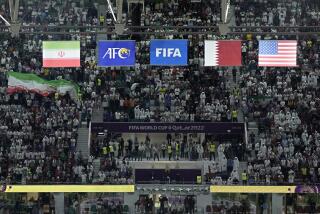U.S. Favors Iraq in War, Shultz Indicates
- Share via
WASHINGTON — Secretary of State George P. Shultz, clearly tilting toward Iraq in the Persian Gulf war, said Tuesday that the United States is trying to block the supply of weapons to Tehran “to deprive Iran of its war-making capability.”
Shultz, interviewed by European journalists on a U.S. Information Agency satellite television broadcast, described the recently disclosed U.S. arms sales to Iran as an aberration that would not be repeated. He said Washington will strive to discourage all nations from sending arms to Iran but will not try to impose similar restrictions on the supply of weapons to Iraq.
No Winner or Loser
“We think the principal recalcitrant party is Iran, and so--to the extent that Iran’s military capability can be reduced--that presumably will help bring them to a frame of mind where they’re willing to sit down with Iraq and try to reach an agreement,” Shultz said. “We think the right kind of agreement is one that maintains the territorial integrity of each side and doesn’t have, so to speak, a winner and a loser.”
Shultz’s comments were the clearest indication yet of a U.S. preference for Iraq.
When the war began in September, 1980, former Secretary of State Henry A. Kissinger summed up the view of most U.S. policy-makers when he quipped: “It is too bad they both can’t lose.” However, U.S. officials have been concerned for several years that Iran ultimately might prevail in the 6-year-old war and spread its brand of Islamic fundamentalism throughout the Gulf area, an outcome they said would be catastrophic for U.S. interests in the Middle East.
Nevertheless, official U.S. policy has been to remain neutral in the conflict.
State Department spokesman Charles Redman said Tuesday after Shultz’s telecast that the United States remains neutral in the war but that neutral does not necessarily mean even-handed.
The United States “has never meant to say . . . that we are uninterested in the outcome of the war,” Redman said. “In that sense, neutrality did not mean neglect.”
He said there was no inconsistency between professed U.S. neutrality and its policy of depriving Iran, but not Iraq, of the means to continue the fight.
Shultz refused to comment on a report first carried by the Washington Post that the United States was supplying Iraq with intelligence information, including reconnaissance satellite photos, that could help the Iraqi air force pick out Iranian targets. But another U.S. official confirmed that Washington had given intelligence to Baghdad, although he said it was less extensive than the Post account indicated.
The official said the State Department knew about the intelligence program and approved it, although “we certainly didn’t want to see it in the newspaper.”
Shultz faced a barrage of questions from the European journalists about President Reagan’s decision to send weapons to Iran as part of a program intended to cultivate relations with moderates there and to obtain the release of U.S. hostages held in Lebanon.
Shultz, who has made no secret of his opposition to the arms sales, said: “The question of further arms sales to Iran from the United States has been settled, and there won’t be any more under the present circumstances.”
More to Read
Sign up for Essential California
The most important California stories and recommendations in your inbox every morning.
You may occasionally receive promotional content from the Los Angeles Times.










